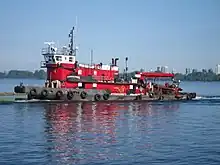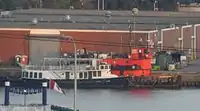
The Radium Yellowknife is a Canadian tugboat.[1] Like other vessels built for service on the MacKenzie River, its tributaries, and Great Bear Lake and Great Slave Lake, she was first built in a shipyard in Vancouver, British Columbia, then disassembled and shipped by rail to Waterways, Alberta. There she was reassembled and launched into Clearwater River on August 18, 1948 - late in the season, as the rivers used to freeze in late September or early October. Her reassembly was delayed initially by floods in the Fraser valley in May hindering transport, and then by a derailment of several of the railway cars carrying her components. [2] After launch, she sailed to the portage on the Slave River at Fort Smith, Northwest Territories and was dragged overland across the portage to the lower river, where she could then access the Great Slave Lake, the MacKenzie River, and the Beaufort Sea.[2][3]

When she was launched she was the fifteenth and largest vessel operated by the Northern Transportation Line – also known as the "Radium Line" as many of the vessels contained the prefix "radium" in their name.[2] One of the fleet's most important ports of call was Port Radium, on Great Bear Lake, the source of much of the uranium used by the Manhattan Project during World War II.
The spring thaw comes late on the Mackenzie River and her tributaries.[4] In 1950, she arrived at Hay River on June 15. In 1953, the Radium Yellowknife was frozen-in at Norman Wells on Great Slave Lake as late as June 8.[5]
In 2003, she transited the Northwest Passage, overwintering in Iqaluit, Nunavut, when the ice came early.[6][7] Since then she has served on the Great Lakes.


| tonnage | 235 tonnes |
| length | 40 metres (130 ft) |
| draft | 1.6 metres (5 ft 3 in) |
| beam | 8.6 metres (28 ft) |
| IMO number | 5288956 |
| power | 2 × 750-horsepower diesels |
| launched | 1948 |
In 2005 Atomic Energy of Canada published a study of the toxic legacy of the mining of radioactive ore at Port Radium.[10] According to the report of the Radium Yellowknife and all the other surviving vessels of the Radium line were found to be free of contamination, with the exception of the Radium Gilbert.[11]
The boat was used in the fictional television drama The Handmaid's Tale Season 4 Episode "Vows", portraying a vessel used by a humanitarian agency sending supplies to Chicago from Canada.
References
- ↑ Dean Irvine, ed. (2005). The Canadian Modernists Meet. University of Ottawa Press. pp. 30, 34, 36. ISBN 9780776605999. Retrieved 2012-09-05.
- 1 2 3 B.T.R. (1948-09-09). "Freighting to the Northland". Saskatoon Star-Phoenix. Retrieved 2012-09-05.
- ↑ B.T.R. (1958-09-14). "Cruising down the Mackenzie". Ottawa Citizen. p. 165. Retrieved 2012-09-05.
- ↑ "First Vessels with Supplies Cross Lake to Yellowknife". Edmonton Journal. 1950-06-15. p. 17. Retrieved 2012-09-05.
- ↑ "Vessels Fight Ice, Low Water In Northern Supply Trips". Edmonton Journal. 1953-06-08. Retrieved 2012-09-05.
- ↑ "Tugboat Radium Yellowknife". Flickr. 2007-07-03. Retrieved 2012-09-05.
- ↑ John McFarlane (2011). "A List of the Partial Transits of the Canadian Northwest Passage 1921 to 2004". Retrieved 2012-09-05.
- ↑ "RADIUM YELLOWKNIFE - IMO 5288956". Shipspotting. 2008-08-14. Retrieved 2012-09-05.
- ↑ ""Radium Yellowknife" - call sign CZ9714". flickr. 2009-11-16. Archived from the original on 2012-09-05. Retrieved 2012-09-05.
- ↑
"Status Report for the Historic Northern Transportation Route redacted colour" (PDF). Atomic Energy of Canada. December 2005. p. 86. Retrieved 2018-01-13.
Ships were used along the NTR to move barges loaded with uranium ore and concentrates (among other materials and supplies). Some vessels also transported cargo on board. Fifteen Radium Series vessels used along the NTR were identified in SENES (1994). Three were determined to have been scrapped, and the disposition of one, the Radium Cruiser, was unknown. Radiological investigations were conducted on the other eleven vessels. Only one, the Radium Gilbert, showed any evidence of contamination.
- ↑
Peter C. Van Wyck (2010). Highway of the Atom. McGill-Queen's Press. p. 36. ISBN 978-0-77358-087-9. Retrieved 2018-01-13.
There is material leakage all along the sides of the Highway, as well as on the vessels and barges used to traverse it. The merchant fleet Radium line: the Radium King, the Radium Queen, the Radium Lad, the Radium Express, and of course, the Radium Gilbert ... and so on. The rest of the list: Cruiser, Prince, Gilbert, Charles, Scout, Yellowknife, Franklin, Dew, Prospector, Trader, Miner.
External links
 Media related to Radium Yellowknife (tugboat, 1948) at Wikimedia Commons
Media related to Radium Yellowknife (tugboat, 1948) at Wikimedia Commons